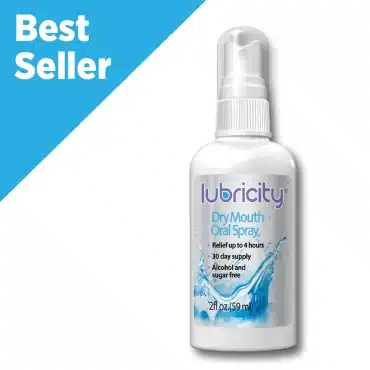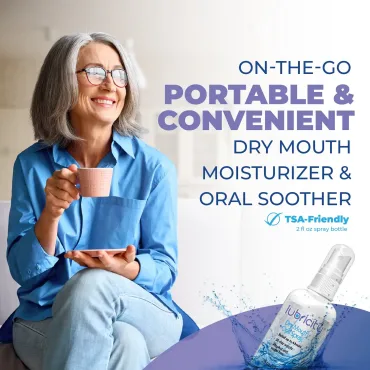Can Dry Mouth Cause Metallic Taste?

Dry mouth, or xerostomia, is a medical condition that causes a decrease in saliva production. Unfortunately, this leaves people with an uncomfortable, dry feeling in their mouth and throat. Xerostomia can make eating, talking, chewing, and swallowing difficult. Dry mouth can adversely affect someone’s dental health and digestive system. It may also lead to other symptoms such as mouth sores, bad breath, metallic taste, and dry throat.
In addition to these uncomfortable dry mouth symptoms, some people simultaneously experience metallic taste. Metallic taste is a taste disorder known as dysgeusia. It is an abnormal or impaired sense of taste or an unpleasant alteration of taste. It’s usually described as a persistent metallic, sour, bitter, or other unusual, bad taste in the mouth. Learn more about metallic taste causes and symptoms, here.
Dry mouth symptoms can be connected to metallic taste symptoms. Oftentimes, the cause of dry mouth and metallic taste symptoms are the same, and once the cause is identified and treated, both symptoms can dissipate.
As an example, someone undergoing head or neck radiation could be experiencing both dry mouth and metallic taste as a side effect of radiation. This is due to the fact that radiation therapy can cause damage to the salivary glands. Once the treatment is completed, the symptoms of dry mouth and metallic taste should go away in a few weeks.
Dry Mouth Symptoms
A dry mouth typically leaves you feeling uncomfortable and dry. People may even have difficulty with everyday tasks such as chewing and speaking. Here are some common symptoms of dry mouth:
- A feeling of dryness and stickiness in your mouth
- Thick and stringy saliva
- Bad breath
- Difficulty chewing, talking, swallowing, and (in extreme cases) breathing
- Dry or sore throat
- Dry or grooved tongue
- Altered taste
- Problems wearing dentures
- Cracked lips and split skin near the corners of the mouth
Dry Mouth Causes
Dry mouth can be caused by a variety of different reasons. There are medical and non-medical reasons, including:
- Sjögren’s Disease
- Prescriptions and over the counter medications
- Cancer treatment
- Sleep apnea or mouth breathing
- Dementia and its treatment
- Asthma and its treatment
- Poor oral hygiene
- Anxiety
It is crucial to understand your dry mouth symptoms and trying to reduce them. Unfortunately, dry mouth can lead to larger problems than just general discomfort. Additionally, dry mouth may lead to an increase in plaque, tooth decay, mouth sores, poor overall oral hygiene, and potentially oral diseases.
Metallic Taste Causes
Similarly, to dry mouth, metallic taste can leave you feeling uncomfortable and cause other problems. Some causes of metallic taste are:
- Cancer treatment
- COVID-19
- Gastroesophageal Reflux Disease (GERD)
- Prescriptions and over the counter medications
- Allergies and Infections
- Central Nervous System (CNS) disorders
- Chemical exposures
- Poor oral hygiene

In addition, metallic taste can affect the way we eat. If you are experiencing metallic taste, you may choose saltier, spicier, or more sugary foods. This is done in order to mask the general, unpleasant taste. However, these food choices may lead to poor nutrition.
How is Dry Mouth Connected to Metallic Taste?
Both dry mouth and metallic taste can negatively affect someone’s mouth. The most common cause that create both of these are prescriptions and over the counter medications.
Metallic taste and dry mouth can be an effect of many different medications or treatments. Some medications and vitamins that may cause metallic taste and dry mouth are:
- Blood pressure medications/treatments
- Diabetes medications/treatments
- Cancer treatments
- Certain antibiotics
- Certain supplements
There are also multiple medical conditions that have dry mouth and metallic taste as a side-effect of the disease or its treatment:
- Cancer Treatments (especially head and neck areas)
- COVID-19
- Dementia & Alzheimer’s
- Poor Oral Hygiene
- Diabetes
- Allergies
- Anemia
In some cases, changing or adjusting (when possible) the dose of medications can help relieve your symptoms. If dry mouth and metallic taste symptoms are caused by a medical condition or its treatment, once the underlying cause is treated the symptoms should go away with some time.
However, there are times that dry mouth can become chronic if this symptom is not properly addressed. Poor oral hygiene may lead to oral issues ranging from metallic taste to gingivitis. It is important to speak with your doctor and/or dentist to ensure they are aware of your symptoms, and they can help you to get much needed relief.

How to Avoid Dry Mouth and Metallic Taste
There are some simple things you can incorporate into your day-to-day routine to avoid dry mouth and metallic taste. First and foremost, it is essential to maintain good oral hygiene. It is crucial to brush and floss at least twice a day. Routine dental visits and cleanings will help as well. Finally, making sure you’re hydrated is very important for your overall health.
For immediate symptomatic relief, use Lubricity Dry Mouth Spray for relief of dry mouth symptoms and MetaQil to alleviate metallic taste.
Lubricity is a moisturizing mouth spray specifically designed to provide comfort and relief from dry mouth symptoms. Lubricity offers lasting relief, from even the most persistent dry mouth symptoms. Learn more about Lubricity here.
MetaQil is an innovative mouth rinse that provides comfort to those who suffer from taste disorders that cause a persistent sensation of bad taste. MetaQil gently cools the mouth and offers instant, long-lasting relief from metallic taste symptoms. It doesn’t “sting” your mouth like a typical mouthwash may as well. Learn more about MetaQil here.
Importance of Taking Control of Dry Mouth and Metallic Taste
Besides oral discomfort, dry mouth and metallic taste may lead to other issues. Dry mouth and metallic taste may lead to poor quality of life, oral infections or sores, and even overall poor nutrition.
Since dry mouth and metallic taste may lead to more serious conditions, it is critical to understand why you are experiencing them. If your dry mouth symptoms are causing metallic taste, it is important to speak with your healthcare professionals about possible treatment options and discover the underlying cause of them.
We can take small steps every day to improve our health and overall quality of life.
What is Lubricity?
Lubricity is an odorless, flavorless, and colorless spray that is perfect for people who are overly sensitive to taste. Our Dry Mouth Spray also has Zero Calories, NO Gluten, NO Alcohol, NO Sugar, and is Vegan-Friendly!
Lubricity Dry Mouth Spray has 5 simple ingredients: Hyaluronic Acid, Xylitol, Sodium Benzoate, Potassium Sorbate and Purified Water. This simple formula is clinically proven to alleviate your dry mouth symptoms for up to 4 hours.
How to use Lubricity?
Lubricity Dry Mouth Spray comes in a convenient 0.5 oz and 2oz spray bottle. Simply point and spray 3-5 times per use. When used as directed, Lubricity provides up to 4 hours of relief from dry mouth symptoms.
For best results, we recommend using Lubricity Dry Mouth Spray as follows:

Use Lubricity after a meal and before bed. If needed, Lubricity can be used more than 4 times per day. *Some may need 3-5 pumps per use, as the bottle needs to be primed upon opening. Relief from symptoms begins immediately. Maximum effectiveness is achieved after 72 hours of continued use.





